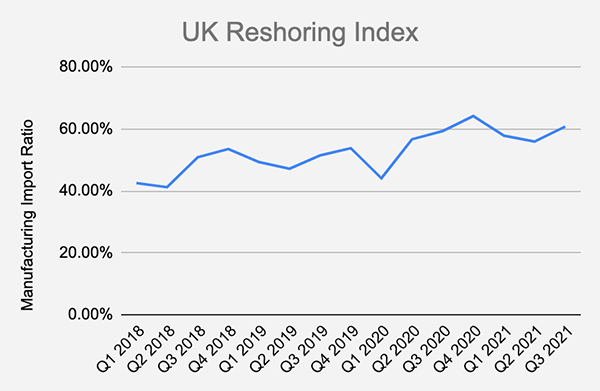-
The UK is becoming more reliant on manufacturing imports from Asian low-cost countries, according to the Manufacturing Technology Centre’s inaugural UK Reshoring Index.
-
The analysis shows that the manufacturing import ratio reached 61% in Q3 2021, a significant increase from 43% in Q1 2018, indicating a lower level of reshoring despite the pandemic supply shock.
-
The index comes as The Industrial Policy Research Centre (IPRC) launches its Manufacturing Strategy, outlining steps to boost UK manufacturing output.
Coventry, 7 February 2021: The United Kingdom has become increasingly reliant on manufacturing imports from Asian low-cost countries over the past four years, despite supply chain disruption due to the pandemic, according to the Manufacturing Technology Centre’s inaugural UK Reshoring Index.
The index analyses two metrics – UK manufacturing output and import data from 14 Asian low-cost countries (LCCs) – to track whether the UK is reshoring manufacturing back from Asia.
This analysis comes as the Industrial Policy Research Centre (IPRC) releases its Manufacturing Strategy, outlining steps to boost manufacturing output and ensure the sector is futureproofed for decades to come.
UK has become increasingly addicted to Asian manufactured imports
The index’s manufacturing import ratio (MIR) – manufactured goods imports from Asian LCCs as a percentage of UK manufacturing gross output – reached 61% in Q3 2021, a significant increase from 43% in Q1 2018. A higher percentage indicates a lower level of reshoring.
This increase in the MIR marks the continuation of a decades-long trend, as globalisation and the free movement of goods have led to British companies relocating their production overseas, and consumers becoming more reliant on manufacturing goods produced in low-cost countries.
The increase in the MIR is marked by two key trends.
Pandemic hits UK manufacturing output
First, UK manufacturing output is yet to recover from 2018 levels. In Q3 2021, the latest period of data available, the figure was still 3% lower than Q1 2018.
Growth was chiefly hampered by the COVID-19 pandemic, which put a variety of strains on the UK manufacturing sector. Tough lockdown measures forced factories to close across the country in March 2020, with hundreds of thousands of workers placed on furlough – in April 2020 alone the figure was 911,000. As a result, manufacturing output declined by a third during the first two quarters of 2020.
Output was hit again during subsequent COVID outbreaks as new variants emerged. During the spread of the Alpha variant towards the end of 2020, manufacturing firms reported high levels of worker absences. Output fell by more than 5% in Q1 2021, the only quarterly decline since the start of the pandemic.
Consequently, the UK became increasingly reliant on imports to make up for this fall in output. This is reflected in the index: throughout 2020 the MIR from 44% to 64%.
Asian countries demonstrate resilience as imports skyrocket
Second, imports from Asia have been remarkably resilient. From Q1 2018 to Q3 2021, the total volume of imports from LCCs increased by 39%. For Chinese imports alone, the growth was 67%. This held up during the pandemic despite shocks in the global supply chain.
While imports from Asian countries temporarily fell during the first year of the pandemic, volumes recovered at a faster rate than UK manufacturing output. Reasons for this include the pandemic starting earlier in Asia, existing resilience from previous pandemics like SARS, and stricter measures that prevented successive COVID outbreaks. As a result, Asian countries were able to meet increased demand when the UK needed it.
Dr Clive Hickman OBE, Chief Executive of the Manufacturing Technology Centre (MTC) and Chair of the Industrial Policy Research Centre (IPRC), said: “Our analysis shows that the UK continues to be too reliant on manufacturing imports from Asian low cost countries. We must lead a renaissance in UK manufacturing with a renewed focus on jobs, skills and resilience to encourage the reshoring of industry. These efforts begin with a National Manufacturing Strategy to ensure that the sector is future proofed for the decades to come. Focusing on building stronger links between academia and industry, boosting devolved powers to create regional industrial strategies and providing a specific funding pot for Net Zero manufacturing will boost the UK’s industrial capabilities, improve productivity and deliver thousands of green jobs for the future.“










